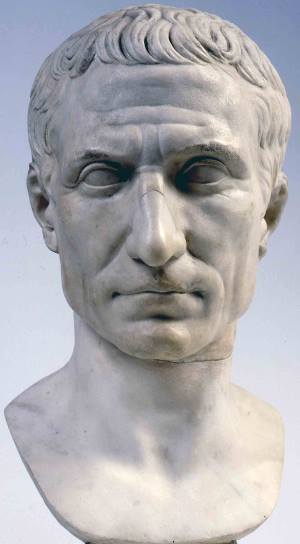Julius Caesar was born in Rome in 102 BC. His mother was Aurelia Cotta and his father was Gaius Julius. It is claimed that Caesar took the name “Ceasar”, which means “cut off” because it was taken by cutting the belly of his mother who died at his birth. He is also the inspiration for today’s cesarean section operation. Julius Caesar, a great statesman, was also a very famous writer too. Caesar mostly took the side of the people in his political attitude and tried to remove the pressure of the Roman nobles on the Roman citizens.
The name Caesar was associated with leaders such as Alexander the Great, Sun Tzu, Hannibal, Genghis Khan, and Napoleon Bonaparte, who are considered by historians to be the most important military tacticians and strategists in history due to their military abilities. Caesar won tactically spectacular victories, both at the battle of Gergovia during the Gallic wars and at the battle of Dyrrhachium during the Roman civil war. However, Caesar’s tactical genius showed itself in the siege of Alesia during the Gallic Wars, the battle of Pharsalus during the civil war, Pompey’s defeat by his outnumbered troops, and the destruction of Pharnaces’ army at the Battle of Zela.

He defeated the two sons of Pompey in Spain in 45 BC and finished Pompey’s dynasty. After these successes, Caesar became the sole owner of all authority in the Roman Empire. He received the title of emperor on the condition that he passes from the title of the ruler to his successors. His dictatorship was extended for 10 years. His daughter Tullia died in February of 45 BC. Caesar could not recover from this shock throughout his life.
By using the powers he gained, Caesar made very beneficial reforms for the state, regulated the legal situation of the Italian cities, and reformed the administration of the Roman States. Meanwhile, he eased the debt laws, granted citizenship and senatorial powers to the people of the states other than Rome, and enabled the poor to establish colonies in Carthage and Corinth.
These measures which were taken by Caesar severely limited the powers of the Senate. When he achieved a lifelong dictatorship in 44 BC, the rumors started to spread that he would establish a monarchist regime instead of a republican government. Unwilling to accept this, the aristocrats prepared an assassination, led by Brutus and Cassius. Caesar was assassinated in Rome on March 15, 44 BC, at the age of 56 while he was climbing the stairs of the senate. Seeing Brutus among the assassins, Caesar’s last words were “You too, Brutus?”
The assassins told the people of Rome that Caesar’s murder was a great success and beneficial for the people. However, when the public’s reaction was not like how they expected it to be. Assasins had to leave Rome for their own safety. The Roman people did not forgive the murderers. At that time, when it was learned that the senate had forgiven those who had killed Caesar, the people ransacked the senate. The Senate was set on fire. Brutus and Cassias, who led Caesar’s murderers, fought against the Roman army and both Brutus and Cassias committed suicide after they were defeated. The Roman Empire retained its power for 500 years thanks to Caesar’s conquests. The name of Caesar, who founded the greatest empire of his time, was used synonymously with “emperor” in Rome. Emperors were traditionally called “caesars” even long after his death.
Get Roman History Expert Tour Guide in Turkey
Roman history in Asia Minor and especially the reforms of Julius Caesar are very important topics for me. I believe a person should study the life and ideals of Julius Caesar to understand the imperial era of the Roman Empire which had a great effect on ancient cities of Anatolia such as Ephesus, Miletus, Iconia, and many more. Contact me to hire a professional licensed tour guide in Turkey who is experienced in cultural tours and Roman Ruins of Turkey. See you soon, Hasan Gülday.